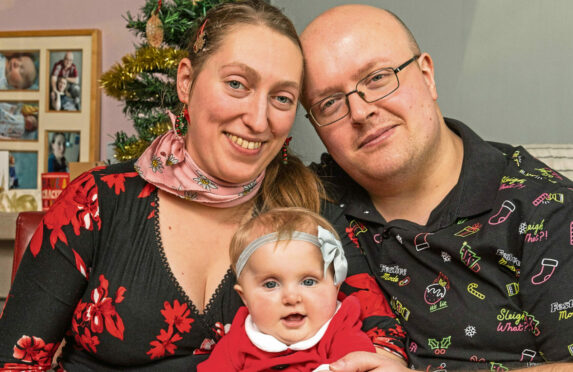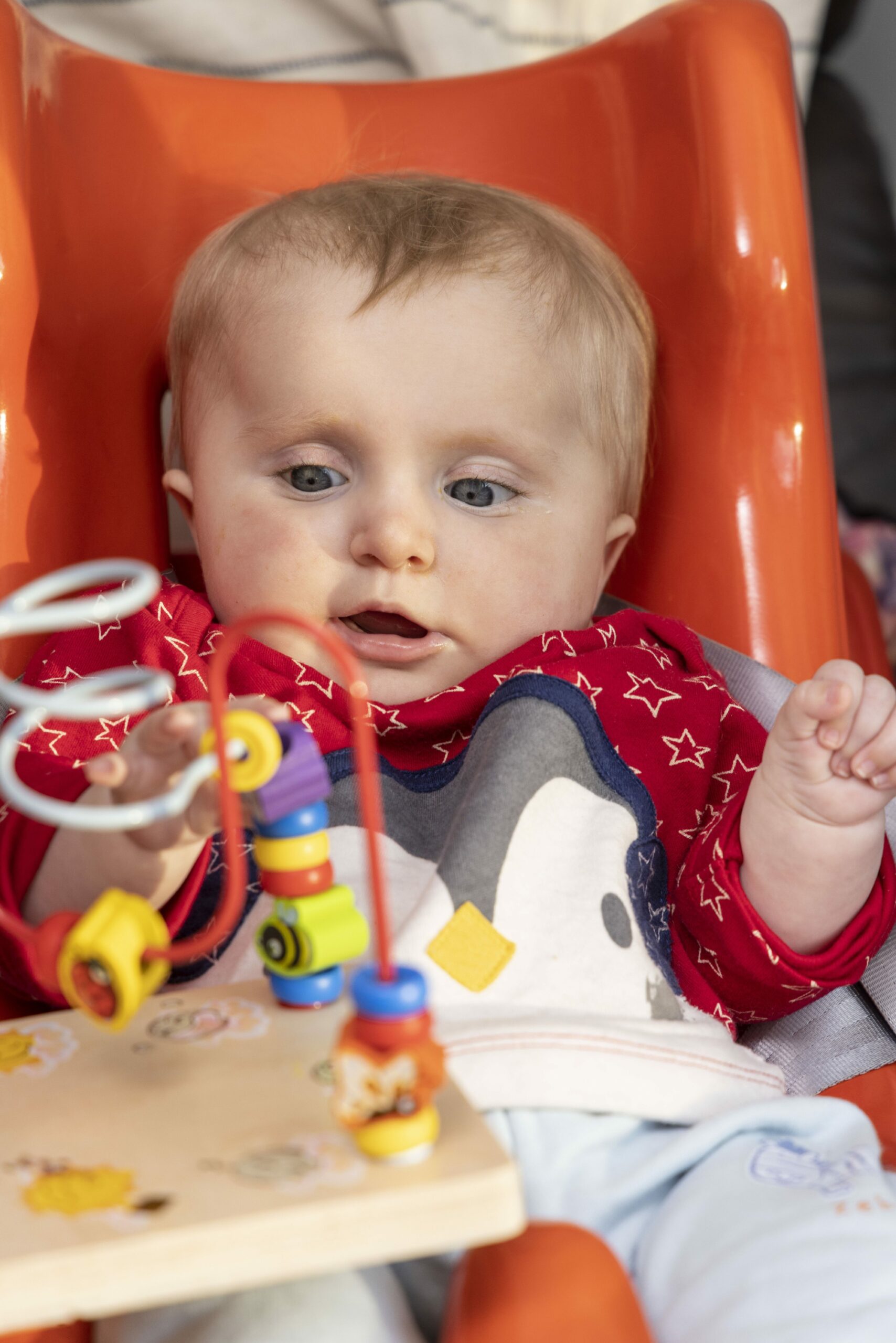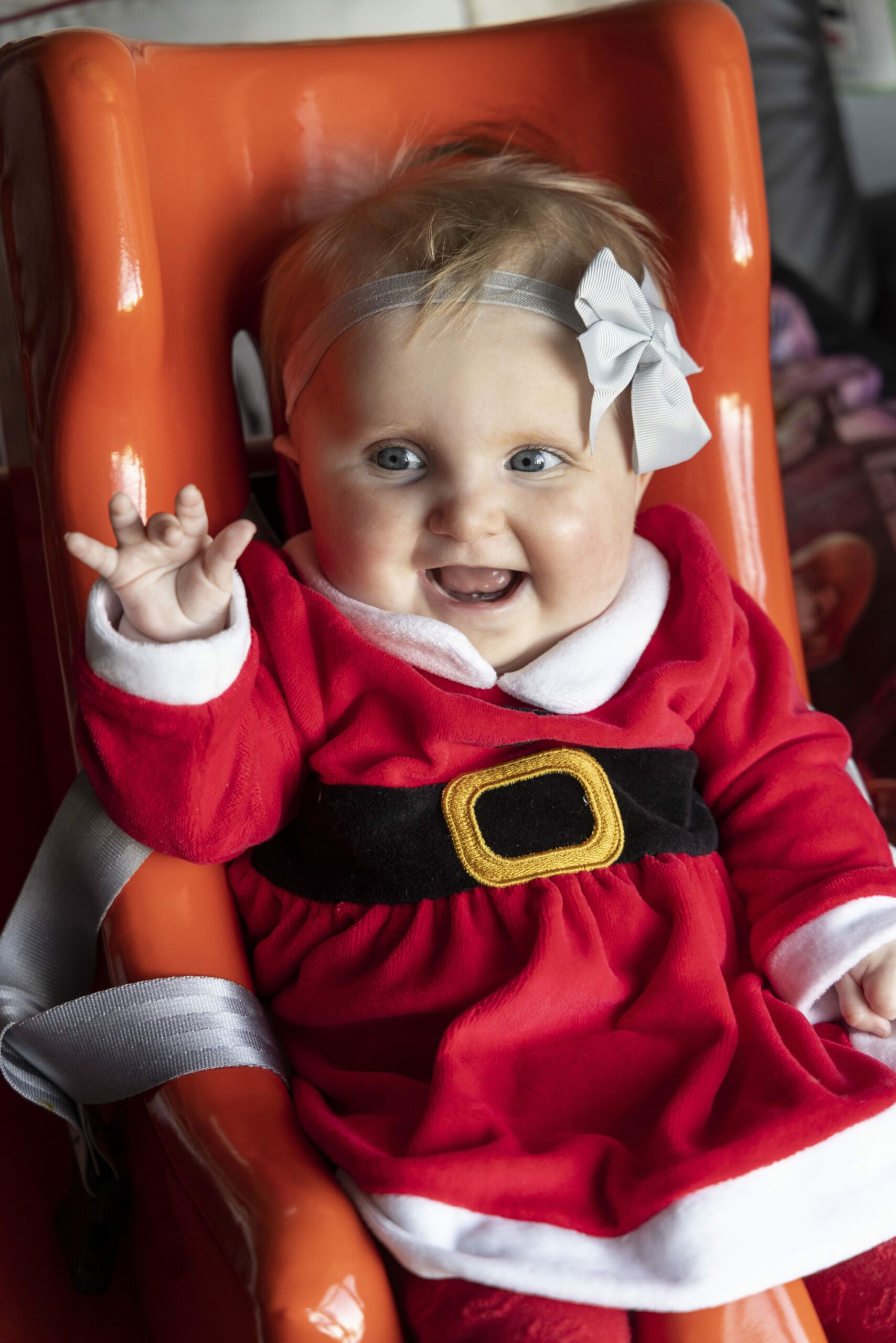
Watching their babies enjoy a first Christmas is a special moment for all parents but for Richard Winfield and Margaret Paluszynska, it will be extra special.
Their daughter Isabella was born with the most severe form of the rare condition spinal muscular atrophy – a muscle-weakening illness with potential consequences that could not be more serious or potentially heartbreaking.
So when the seven-month-old, who in May became one of the youngest patients in the world to be given the most expensive drug in the world, reaches out to grasp her much-loved squeaky lamb, before happily turning the pages of a favourite fabric book, her mum and dad know how lucky they are.
Cuddling up beside the Christmas tree with little Isabella – who has Type 1 SMA, a degenerative illness that weakens muscles, causes breathing difficulties and occurs in only three cases each year in Scotland – her parents described how the wonder drug has enabled their precious daughter to reach landmarks they could never have dreamed possible.
Delighted mum Margaret, 35, a translator, said: “Isabella is doing great overall. Her hands are pretty much what you’d expect at this age. She has full movement on reach and grab. She can self-feed with a baby spoon and steals food from our plates if she can.
“Her right hand is slightly stronger than the left but she is pretty proficient with anything within reach, or just out of reach. She can’t roll herself over to reach something yet but she can sit with help, and she is able to hold herself and her head upright until she gets very tired. She is a cheeky little creature who smiles and laughs and plays with her toys and loves to chatter.”
IT trainer Richard, 36, said: “Her grandparents have tried to teach her the xylophone. My dad put the mallet in her hand, and once she had figured out you use it to hit the xylophone and make the sound, she was whacking away at it quite merrily.”
Isabella, from Archiestown, in the north-east, is one of only two infants born in Scotland to be treated on the NHS with potentially life-saving Zolgensma, described as the world’s most expensive drug.
In June, we told how Glasgow’s Royal Hospital for Children had given the first UK dose to a baby in February and how, soon after, Isabella became the second to receive the single-dose treatment with a list price of £1.79 million.
She was 20 days old when it was administered on May 20, just a week after diagnosis and five days before five-month-old Arthur Morgan, who was the first baby in England to receive the therapy, making her the youngest child in the UK to have Zolgensma and among the youngest in the world.
But until recent years there were no treatment options available for little ones with SMA. Most babies born with the condition do not survive their second year. The emergence about four years ago of the drug nusinersen helped prolong life, but Zolgensma – given in a one-off dose, ideally within the first six months of birth and potentially with no need for further treatment – is, according to specialists, a game changer with the potential to allow babies to sit, crawl and walk.
Margaret hopes her little girl will continue to make good progress but says the priority is enjoying her first Christmas: “She is so little she won’t understand Christmas just yet. Mummy and daddy know it’s Christmas but for her it’s just another day. We’re not really planning anything too big.
“She is still at the stage where she likes her sensory and newborn toys and likes anything that makes a sound or has texture. She has a squeaky lamb she loves and likes a little piano that I bought that has a touchpad that makes a noise. It is for little ones aged one year plus but she can tap the keys and make some sound. She is definitely musical and reacts to music well. And she can hold a book and turn the pages. She is going to be a musical reader. She is a bright little thing.”
Margaret, who carries out muscle-strengthening exercises with her daughter during play sessions, added: “Isabella is still a little weak with full anti-gravity movements but she can hold her leg up to some degree, if I lift it. In the bath, she is able to lift her leg from her hip and lift both legs over the level of the water because the buoyancy helps.

“She still has a good chance of developing the strength in her muscles and even support her own body weight and walk too. We have to wait and see whether it will be just small distances at home or whether she will be able to walk independently but there is still the hope of that.
“Children with SMA that didn’t have Zolgensma as early as Isabella don’t have any chance of mobility. The other cases from America that do have mobility are those who were roughly the same age as Isabella when they had the treatment.
“Normally with SMA Type 1, you don’t even dream of mobility. You hope your child will be independently able to have basic life functions. You are just grateful your child is alive.
“The level of mobility Isabella has already, in the natural course of the condition, would never happen. Two-thirds of children with her condition and without treatment wouldn’t make it to age two. Without treatment it is lethal. The only reason we can be positive is because of modern medicine, and the fact that it is some degree treatable, but you never know how the body will respond.”
And it hasn’t been all plain sailing for little Isabella. Earlier this year she was admitted to hospital for a sleep study assessment that monitors breathing and oxygen levels in the blood.
It concluded she was having difficulty breathing at night and needed a non-invasive ventilator at home called a BiPAP (Bi-level Positive Airway Pressure).
Margaret said: “I did expect at some point we might need it but I didn’t expect it to be this early. The doctors said it was quite common because in deepest REM sleep the body is at its weakest.
“During the day she looks fine and she can cry and cough. But that subtle phase, where the body switches to deep sleep at night, is difficult.
“It is not uncommon for healthy people to have breathing problems in deep sleep and children with other conditions – not just SMA – are on ventilators for weak breathing during the night.
“Isabella has a little mask that fits over her nose to regulate her breathing. It is hard to say how long she will need it. It depends how she develops. The hospital will do a follow-up study every so often. The next check-up will be in March.”
Richard revealed that the aftermath of Storm Arwen was a worrying time for the family: “We were one of the properties with a power cut and on that first night we couldn’t use the BiPAP, which has to be hooked up to mains. The battery only lasts for two hours. She was lethargic, grumpy and not feeding well the next day.
“When we had a message from the power company saying they aimed to have power back on at 10pm that night, we decided we couldn’t risk it because we had had similar messages prior to that. The doctors had said she could go 24 hours without her machine but we could not take the risk of the power not being on the second night. We took her to our local hospital – Dr Gray’s in Elgin – where she was hooked up to a ventilator and monitored overnight.”
Isabella is now back to her normal happy self and the family are looking forward to Christmas. Dr Iain Horrocks, the paediatric neurologist who leads the 10-strong team at the Royal Hospital for Children in Glasgow, said: “We are pleased in Isabella’s progress over the past five months since gene therapy treatment.
“This journey with her family and the improvements we have all been witnessing have been a delight to be part of. We are really pleased with her motor development and expect with the respiratory support she has just commenced to see some lovely improvement here too.”
Margaret said: “We are so grateful to not only Isabella’s doctors, but to our family, people from the local community, and the health and support workers who have been looking after and helping us since Isabella came home. We wouldn’t have managed to keep going if we were alone.”
Regulator to rule on new drugs for spinal condition
Regulators will decide within weeks whether a new treatment for patients with a rare neuromuscular disease will be available in Scotland.
The treatment – risdiplam, which can be taken at home as a syrup – will be considered by the Scottish Medicines Consortium on January 11 when the body will decide whether to recommend the drug is funded by the NHS for the treatment of spinal muscular atrophy (SMA).
Also called Evrysdi, it has been approved for use south of the border for those with SMA aged two months and older, as part of a deal known as a Managed Access Agreement (MAA) between NHS England and the drug’s manufacturer, Roche.
The list price of risdiplam is £7,900 per 80ml vial, but a discounted deal is reported to have been struck to make it available to the NHS. It is especially important for those with SMA who cannot receive either of the two existing treatments – Spinraza (also known as nusinersen) and Zolgensma.
Liz Ryburn, SMA UK’s support team manager, said: “We look forward to continuing to take part in the Scottish Medicines Consortium’s considerations as to whether they will recommend that risdiplam is funded by the NHS for the treatment of SMA.
“We will join the committee on January 11 to continue to represent the patient voice. A positive decision about this home-based oral daily medication would open the door and offer life-changing potential to those who have not yet had the opportunity to access treatment.”
Ryburn also applauded progress so far with Zolgensma, which was used to treat seven-month-old Isabella Winfield. The Sunday Post told in June how she had become the second Scot to get the drug.
Ryburn said: “Isabella is doing fantastically and we are delighted. All the children treated so far – some 65 in England and two in Scotland – are responding and it is looking very positive. Six or seven years ago, these children would have been unlikely to survive beyond the age of two years.
“While the Zolgensma treatment is going very well, to maximise its potential benefit we are relying on early diagnosis, and sadly that does not always happen. We therefore urge the UK National Screening Committee to swiftly progress their review of the case for newborn screening in the UK.
“In 2018, they did not recommend screening for the condition because at that time the criteria for adding SMA to the panel of screening tests were not met. These criteria include the availability of treatments, cost effectiveness and acceptability to the community. Now that things have moved on for SMA with new treatments like nusinersen, Zolgensma, and risdiplam, we are hopeful of change.”

Enjoy the convenience of having The Sunday Post delivered as a digital ePaper straight to your smartphone, tablet or computer.
Subscribe for only £5.49 a month and enjoy all the benefits of the printed paper as a digital replica.
Subscribe © NEWSLINE MEDIA LIMITED
© NEWSLINE MEDIA LIMITED